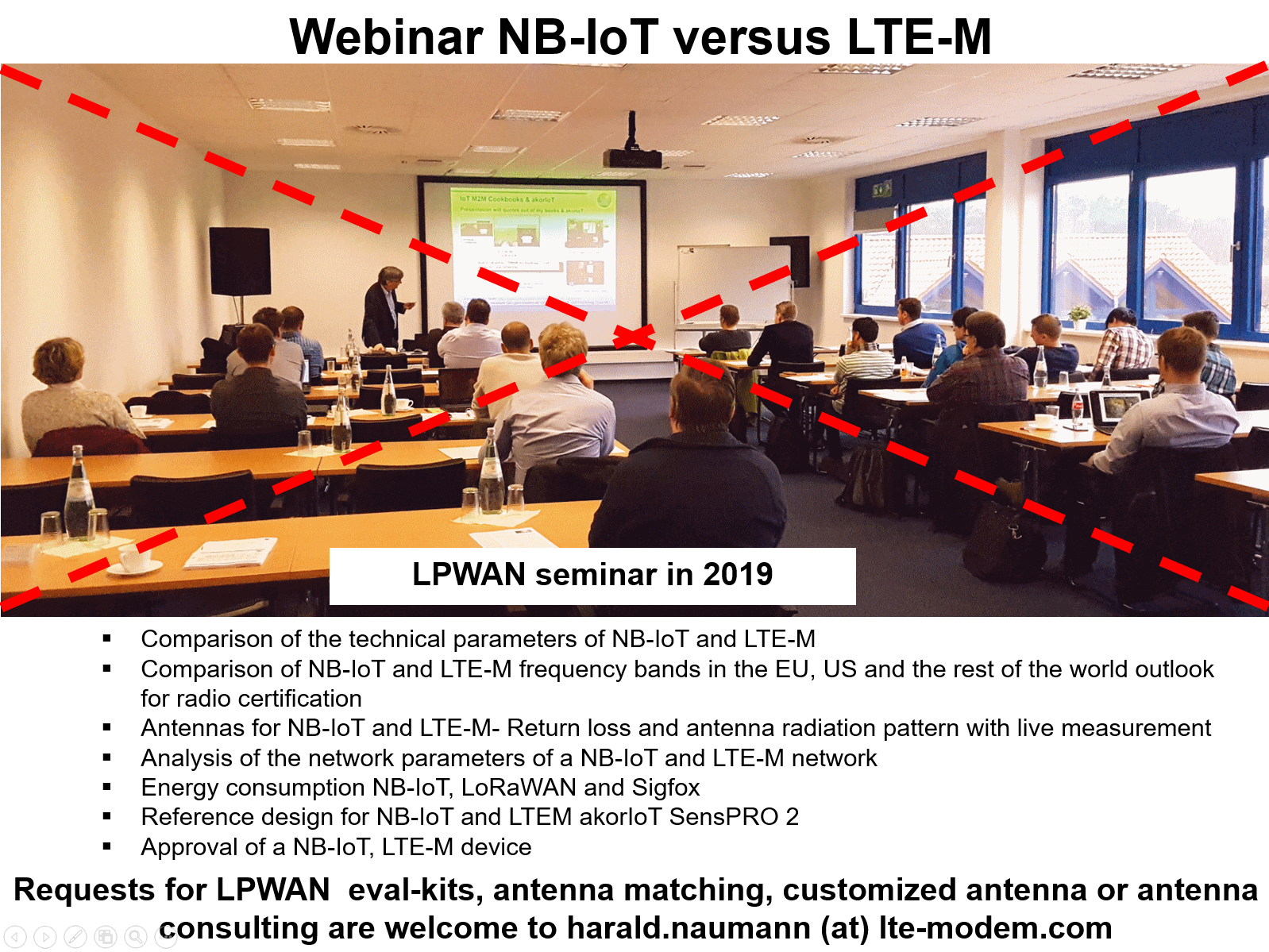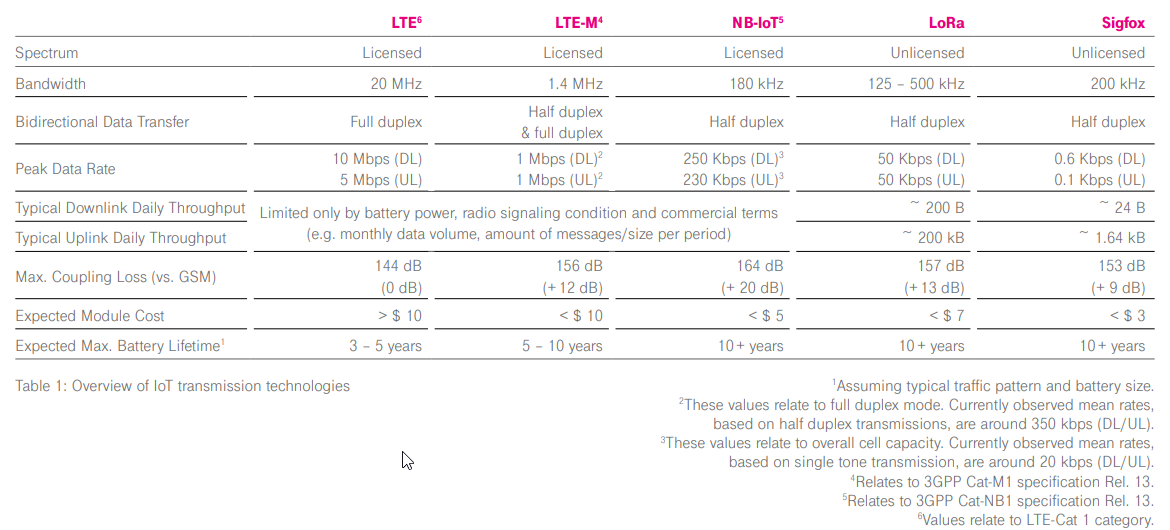What is the difference of NB-IoT and LTE-M?
-
The question I get very often. Now the answer is available in 4 hours webinar. We will explain the various components and show the way from the idea to the IoT device with radio approval. For all companies that register by 24 Dec, we are giving away 12 different chip and flex-PCB #antennas worth 24.24 € as well as a voucher with 24 % discount for an NB-IoT/LTE-M evaluation kit.
Topics:
- Comparison of the technical parameters of #NBIoT and #LTEM
- Comparison of NB-IoT and LTE-M frequency bands in the EU, US and the rest of the world outlook for radio certification.
- Antennas for NB-IoT and LTE-M
- Return loss and antenna radiation pattern with live measurement
- Analysis of the network parameters of an NB-IoT and LTE-M network
- Energy consumption NB-IoT, LoRaWAN and Sigfox
- Reference design for NB-IoT and LTEM akorIoT SensPRO 2
- Approval of an NB-IoT, LTE-M device
Speakers: B. Kerger (Eurofins), W. Oelers (Triptec), H. Naumann (Tekmodul). Language: German.
Schedule and costs:
- Dates KW 4 (25.-28.01.2021) and KW 6 (08.-11.02.2021), daily Mon-Thu 10:00 - 11:30 hrs
- 1 person: 99 € p.p. + VAT
- from 3 persons: 95 € p.p. + VAT
- from 5 persons: 90 € p.p. + VAT
- from 6 persons: on request
Registration and agenda: https://www.eurofins.de/electrical-and-electronics/media-center/webinare/webinar-reihe-lpwan/
I hope to meet with you at the webinar. Question upfront are welcome to harald.naumann (at) lte-modem.com

-
A very nice, simplified overview of the various narrowband technologies can also be found in the Mobile IoT Guide, which you can download here: Download

-
Hi Christian, the table you posted contains several mistakes. It is a copy of a copy of a copy. That is one of the reasons why we offer webinars and seminars.
- Bandwith
The column bandwidth is mixing bandwidth per service with all channels and bandwidth per channel. The bandwidth per channel is linear to the sensitivity.
1.1) Sigfox per Channel is 100 Hz and their bandwidth is 192 KHz in UL. 100 Hz is ultra-low bandwidth. In DL it is more than 100 Hz. I have to check
1.2) NB-IoT is 180 KHz for 12 channels. It is 15 kHz per channel with to option to switch to a 3,75 KHz bandwidth to rise the sensitivity by 6 dB. - Linkbudget / Maximum coupling loss
2.1) With Lora is 141 to 144 dB. The 157 dB is only valid with thermal noise in the laboratory
2.2) The MCL with NB-IoT is not 164 dB mainly. This is in my opinion only valid for the stand-alone operation, but no operator is running it stand alone. - Battery life
No comment. The 10+ years does not mean anything. 10 years on which link budget?
We had 80 participants. Most of them are IoT developers.
- Bandwith
-
@HaraldNaumann Yes, but when we want the exact numbers you tell us to buy your cookbook or attend your webinar. So how can we be educated then?
-
@Stefan-de-Lange my IoT / M2M Cookbook will not tell any about the mentioned mistakes. It will help for PCB and antenna design. The mentioned mistakes you will learn by reading the NB-IoT docs at 3GPP, Sigfox docs at Sigfox website and LoRaWAN with the reading of third party sources or testing like I have done.
The other option is to listen at our LPWAN seminars. Then you get a summary and have the freedom to ask questions and to get the answers.
Nevertheless, the LPWAN Cookbook will tell more about LPWAN, but a table with maximum rates does not help. For that reason, you get two studies free of charge for download here: https://www.akoriot.com/white-papers/
100 pages about LPWAN for free. 50 pages about energy consumption at 134, 144, 154 db link budget with 12, 24, 64 and 5122 bytes.
154 dB with LoRaWAn is impossible. 164 with NB-IoT is impossible in a guarded band or inband NB-IoT network. At 144 dB you are able to compare NB-IoT, LoRawan and Sigfox. At 154 dB LoRWAN has to pass and only NB-IoT and Sigfox is left. 164 dB with NB-IoT you will not reach in the real world. Enjoy the reading. -
@HaraldNaumann This is exactly why I never ask you, because you immediately try to sell me things

-
@Stefan-de-Lange the two studies are free of charge because someone else paid for the man-weeks of work. By the way, nothing is for free. You pay for death with your life

-
@HaraldNaumann With your incredible bias towards LTE I do not trust your results anymore

-
@Stefan-de-Lange the PCBs for testing are open on Attribution-NonCommercial 4.0 International (CC BY-NC 4.0).
https://www.akoriot.com/akoriot_akor4range_l/
You have the freedom to copy it and re-measure it. But you will get the same result. Sometimes NB-IoT is better and sometimes LoRaWAN. You should also read before you judge something.